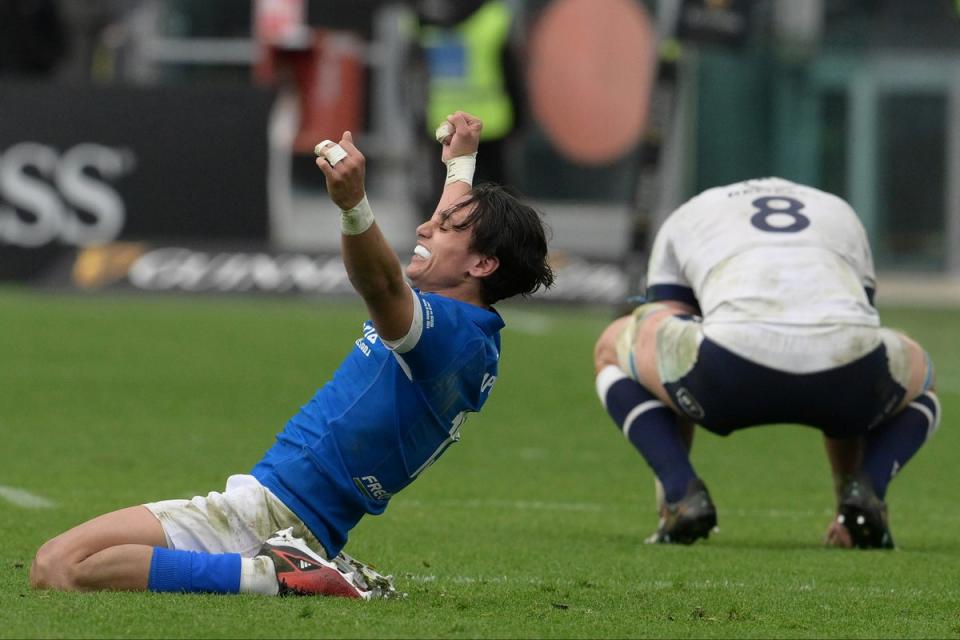The one thing Ireland must prove as they face Six Nations title decider

Ireland aren’t used to losing in the Six Nations. It had been so long since they endured defeat against one of their northern hemisphere rivals that they may even have forgotten what it feels like.
It would be easy to internalise the frustration of being beaten 23-22 by England last weekend and channel it in the wrong way, leading to a downward spiral. But they’re aware they can’t afford to be defined by the pain.
“We’ve been very good at winning and moving on to the next one,” admitted Ireland coach Andy Farrell in the aftermath of the loss. “We’ve got to be really good at losing as well. We’ve got to dust ourselves down and make sure that we turn up with a smile on our face because we’ve got a championship to win next weekend.”
The greatest teams, in any sport, are not defined by how they do when the sun is shining but by how they cope with adversity. For the first time since February 2022, Ireland have tasted Six Nations defeat. They were 80 minutes away from setting the all-time record of consecutive wins in a championship that has been going for almost 150 years.
Then Twickenham happened. Marcus Smith’s drop goal happened and the dream of back-to-back grand slams died in an instant. But as Farrell intimated, there’s no time to feel sorry for themselves – Scotland are coming to Dublin and there’s a Six Nations title to win. Victory in the middle game of the ostentatiously-monikered Super Saturday would do the trick. This is undoubtedly a great Ireland side, they may even still be the best in the world, and this is the chance to show the mettle of true champions by proving they can bounce back.

In Farrell’s reign, they have become the masters of doing just that. While the disappointment of defeat in a home World Cup has lingered over France like a black cloud during this championship, Ireland shook off their own quarter-final heartbreak to smash Les Bleus 38-17 in Marseille in the opener and will, in all likelihood, be lifting the trophy come Saturday evening.
When they were thumped 42-19 by New Zealand at Eden Park in the summer of 2022, they dug deep to win the remaining Tests 23-12 and 32-22 for a historic series win over the All Blacks. That last Six Nations defeat mentioned above – the 30-24 loss to France in Paris in February 2022 – was followed by a ruthless 57-6 thrashing of Italy before England were brushed aside 32-15 at Twickenham and Scotland duly demolished 26-5.
There’s nothing to suggest Ireland lack the fortitude to respond in style at the Aviva Stadium this weekend, no matter how frustrating last week’s clash was, and the squad will see it as an opportunity to prove themselves once more. And, in truth, there may be no more pliable opponent than Scotland.
Ireland have won each of the last nine contests between the sides and 13 of the last 14 versus Scotland. Those nine consecutive triumphs – on both sides of the Irish Sea and once in Japan – have come with an average margin of victory of 15 points.
Does this Scotland side genuinely, truly believe deep down that they can beat Ireland in Dublin? They haven’t done so since 2010 and have never won at the new Aviva Stadium, since it replaced the old Landsdowne Road when it was demolished in 2007. Gregor Townsend has relished breaking long hoodoos in his time as coach, with Twickenham and Cardiff curses both brought to an end, but the Dublin jinx may be a step too far.

“There is a determination to be better, it is tough going through the reviews when you lose but the players have been aligned about where we can improve, and there is no better challenge than Ireland away,” insisted Townsend after announcing a team with two changes – Stafford McDowall earning a start at centre and Ben White returning as scrum half.
He went on to admit that “we have shown the best parts of ourselves in this championship at times but we have also let our concentration slip and if we do that at the weekend we are not going to come away with a win”.
Scotland have had less success than Ireland in recent years at both backing up strong results and shaking off frustrating defeats. Their bounce-backability may not quite be of the same high standard.
In last year’s Six Nations, they were flying after beating England at Twickenham and thumping Wales but promptly lost 32-21 to France before also going down at the hands of Ireland. Meanwhile, in the 2022 championship, they were riding the emotional high of beating England for the Calcutta Cup, only to slip up against an inferior Wales side and then get tonked by France.

They did recover from the controversial, TMO-induced loss to France this year by beating England (what else is new...) but then tripped themselves up in a 31-29 defeat to Italy last time out. It was their worst result for a number of years and in the battle of the teams needing a bounce-back in Dublin on Saturday, Scotland’s task is far the harder.
Farrell has entrusted the same starting XV beaten at Twickenham to exact revenge seven days later, with a couple of bench alterations the only changes to the matchday 23. Ciaran Frawley’s head injury forced his coach’s hand anyway and he’s taken the opportunity to abandon the 6-2 forwards-to-backs split that cost them dearly when Frawley and Calvin Nash were forced off against England – necessitating star scrum-half Jamison Gibson-Park playing on the wing – by reverting to the more conventional 5-3 division.
Ireland have learnt from their team selection mistakes and Scotland will fear that they have also corrected their on-field errors in training this week. The men in green need to bounce back in order to seal another Six Nations crown and recent history suggests that’s exactly what they’ll do.

